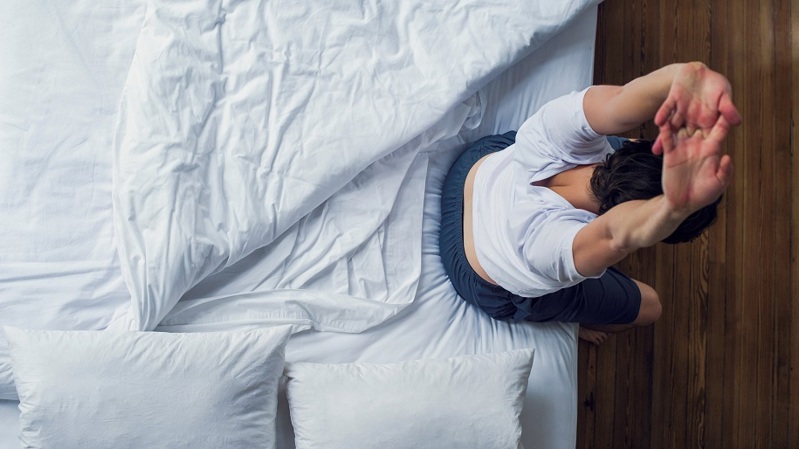Sleep - a critical cornerstone of lifestyle change
Sleep affects every aspect of our bodies, from the brain to physical performance. Because of its holistic nature, its importance in lifestyle change is undeniable. Eevert Partinen, a doctor and a sleep specialist at Terveystalo, explains how sleep is linked to key lifestyle diseases and how it affects our daily activities.

Science strongly supports the argument that sleep is an essential component of health and well-being. Maintaining motivation for lifestyle change, making healthy choices and managing long-term health risks all require good sleep. For the majority of adults, adequate sleep needs are around 7-9 hours per day.
– During sleep, the body repairs the damage done during the day and replenishes energy stores ready for the next day. When making lifestyle changes, adequate sleep provides the energy to change behaviours and maintain the new habit," says Partinen.
Research* shows that sleep has a significant impact on our well-being and our efforts to maintain healthier lifestyles, both in terms of motivation and metabolism.
– When we are sleep deprived, we are understimulated and our energy levels are lower. The body is on a 'maintenance state' and we can only perform the activities we need to do. We don't have the energy to sustain the change and the motivation to adopt a healthy lifestyle," Partinen advises.
Sleep deprivation predisposes to lifestyle diseases linked to metabolic disorders
Sleep quality also affects mental health, stress management and mental well-being. A poor night's sleep can lead to emotional decisions that are impulsive and inappropriate.
– If our brains are not sufficiently rested, they cannot control impulses and the neurotransmitters and hormones that influence appetite are altered. It has been found that when tired, we eat up to 350-500 calories more than after a good night's sleep. Prolonged sleep deprivation therefore predisposes people to unhealthy eating habits and the resulting cravings can lead to weight gain of up to 5-10 kilos a year," says Partinen.
When tired or stressed, the body's immune defence system is weakened because all the energy is used to maintain alertness.
– Sleep deprivation has been found to weaken immunity by up to a third of what it is after a good night's sleep. Even sleeping poorly or too little for 5-7 days weakens blood sugar balance and raises stress hormones. This is how sleep deprivation ultimately predisposes to type 2 diabetes. Conversely, a well-slept night balances blood sugar levels, which lowers the risk of diabetes," says Partinen.
Sleep deprivation also increases the risk of cardiovascular disease directly by increasing the body's inflammatory factors and indirectly by raising blood pressure.
Coaching for effective help with sleep problems
Sleep problems are a fairly common challenge for today's working age population and naturally affect people's work performance and thus the productivity of their work in the organisation. In addition to the benefits for the individual, the investment in good sleep also pays off for companies in terms of increased productivity and reduced sickness absence due to sleep problems.
– Insomnia can be caused by a number of factors. And sleep problems are rarely the only reason people seek treatment. It is important to first make sure that there is no underlying medical condition that requires treatment, and then, with the help of a sleep coach, find ways to improve sleep quality without medication," Partinen advises.
Currently, the most impressive international results in the treatment of sleep problems have been achieved with sleep coaching based on cognitive-behavioural therapy (CBT-I), which is also used at Terveystalo. Through this drug-free treatment for insomnia, patients learn skills that they can use independently to improve their sleep quality in the long term.
– In Finland, we have around 200 sleep coaches specialised in drug-free treatments for insomnia, who can provide support for sleep-related questions or problems. Many of the sleep coaches are also occupational health professionals, so they can take a broader view of sleep problems, including possible work-related factors that affect sleep quality, and find solutions to support better sleep and work capacity," Partinen says.
Articles in scientific releases
* Does sleep affect immunity?
* The role of sleep deprivation in the risk of immune-related diseases
Read more occupational health articles

Terveystalo's digital services have been awarded the internationally recognized ISO27001 information security certification.
Terveystalo's information security practices, processes, and risk management are in line with international best practices.

Does massage help relieve stress? – Touch restores and calms the body and mind
Stress is not always visible on the outside, but the body does show signs when the strain increases. According to Lassi Ylönen, a trained massage therapist at Terveystalo Rela, the body often communicates stress through subtle signs.

Circular economy and artificial intelligence boost performance and improve care
At the heart of sustainable healthcare, technology serves as a tool for improving both the quality of care and accountability. Terveystalo favors solutions that combine sustainability, cost-effectiveness, and medical expertise.

Psychologist: How to make Christmas a relaxed and personal celebration
For many, the anticipation of Christmas begins when cities are decked out in seasonal lights and the first chocolates, calendars, and gingerbread cookies appear on store shelves. Christmas carols ring out and the Tonttuparaati choir sings “Kiire jo on! Kiire jo on!” (Hurry up! Hurry up!). This warm and atmospheric celebration also brings other feelings to mind: how on earth can we get through all this without losing our joy and peace in the rush?

Terveystalo and Gosta Labs deepen their cooperation: the goal is to streamline work with a superior patient information system
Terveystalo is deepening its cooperation with Finnish health technology company Gosta Labs and investing €1 million in the company as a minority investor. The aim is to jointly develop artificial intelligence solutions that improve the quality of care and the efficiency of reception work as part of Terveystalo's new patient information system, Terveystalo Ella.

First aid preparedness in companies requires action and courage
First aid skills increase resilience, but a barometer survey of Finnish organizations' first aid capabilities published in October reveals that the number of trained personnel is alarmingly low.